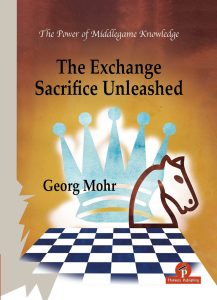Chess is a game of strategy and skill. One interesting part of chess is sacrifices. Sacrifices are when a player gives up a piece. This can surprise many people. Why would someone give up a piece? What do they hope to gain? Let’s explore the reasons behind chess sacrifices.
What is a Chess Sacrifice?
A chess sacrifice is when a player gives up a piece. This can be a pawn, knight, bishop, rook, or even a queen. The aim is to get a better position or win the game. Sacrifices can be risky. They can also be very rewarding. Understanding them can make you a better player.

Credit: www.euroschach.de
Types of Sacrifices
There are many types of sacrifices in chess. Here are some common ones:
- Positional Sacrifice: Giving up a piece to get a better position.
- Tactical Sacrifice: Giving up a piece for a short-term gain.
- Decoy Sacrifice: Luring an opponent’s piece to a bad spot.
- Clearance Sacrifice: Clearing a square or line for your pieces.
- Deflection Sacrifice: Distracting a key opponent piece.

Credit: thinkerspublishing.com
Why Sacrifice?
Players sacrifice pieces for many reasons. Here are a few:
1. Better Position
A player may sacrifice a piece to get a better position. This can lead to control of key squares. It can also help develop other pieces.
2. Attack
Sometimes, a player sacrifices to start an attack. This can put pressure on the opponent. It can also open up the opponent’s king for an attack.
3. Confusion
Sacrifices can confuse an opponent. They may not expect the move. This can lead to mistakes. It can also make them feel nervous.
4. Material Gain
Sometimes, a player sacrifices a smaller piece. They hope to gain a bigger piece later. This is called a material gain.
The Mindset Behind Sacrifices
Making sacrifices in chess requires a special mindset. It is not easy to give up a piece. Here are some thoughts that go through a player’s mind:
1. Confidence
A player must be confident. They must believe their sacrifice will work. This confidence comes from experience and practice.
2. Calculation
Players need to calculate many moves ahead. They must see the benefits and risks. Good calculation helps make the right sacrifice.
3. Creativity
Sacrifices often need creative thinking. Players must see opportunities that others miss. This creativity can lead to unique and successful moves.
4. Courage
It takes courage to sacrifice a piece. The player must be brave. They must trust their plan and not fear losing.
Famous Chess Sacrifices
Many famous chess games have great sacrifices. Here are a few examples:
1. The Evergreen Game
This game was played by Adolf Anderssen and Jean Dufresne in 1852. Anderssen made a brilliant queen sacrifice. This led to a quick and surprising win.
2. The Opera Game
Played by Paul Morphy in 1858, Morphy sacrificed a bishop and a rook. This led to a strong attack on his opponent’s king. He won the game in just 17 moves.
3. The Game Of The Century
Bobby Fischer played this game in 1956. He sacrificed his queen. This led to a beautiful combination and a win.
Learning to Sacrifice
Learning to make sacrifices can be hard. Here are some tips to help:
1. Study Famous Games
Look at games with great sacrifices. Learn why the sacrifices worked. This will help you understand when to sacrifice.
2. Practice Calculations
Work on calculating many moves ahead. This will help you see the benefits and risks of sacrifices.
3. Play Often
The more you play, the better you get. Try making sacrifices in your games. Learn from your mistakes and successes.
4. Ask For Feedback
Play with friends or join a chess club. Ask for feedback on your sacrifices. This will help you improve.
Conclusion
Sacrifices are a key part of chess. They can lead to great victories. Understanding the psychology behind them can make you a better player. Practice, study, and play often. Soon, you will be making great sacrifices too.
chessmantras.com is a participant in the Amazon Services LLC Associates Program, an affiliate advertising program. As an Amazon Associate, we earn from qualifying purchases made through our links.







